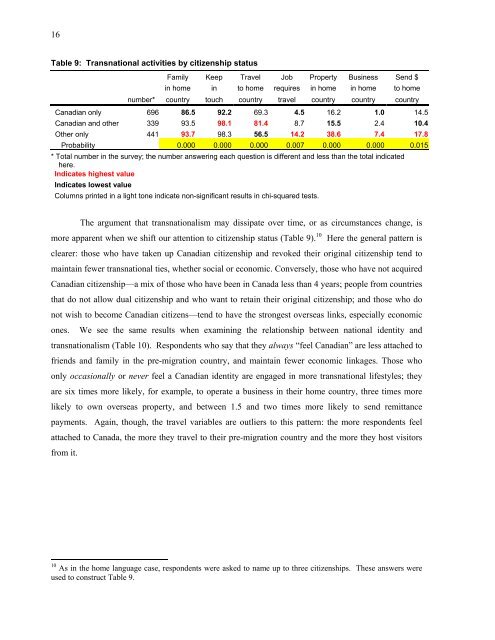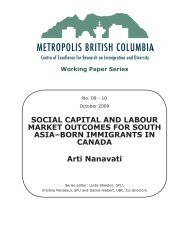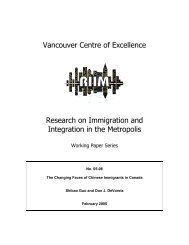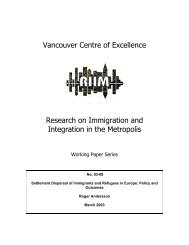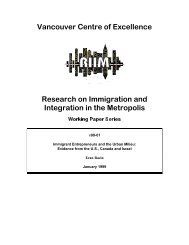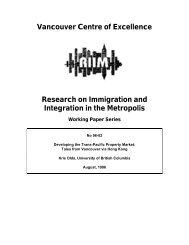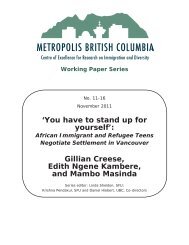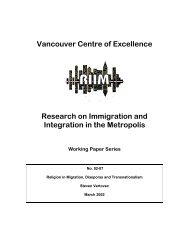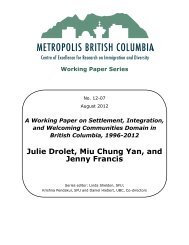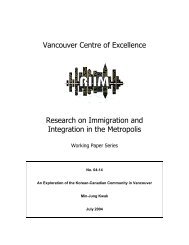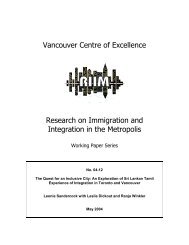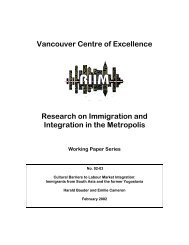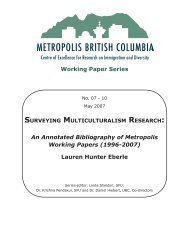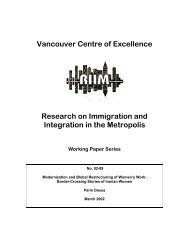Characteristics of Immigrant Transnationalism in ... - Metropolis BC
Characteristics of Immigrant Transnationalism in ... - Metropolis BC
Characteristics of Immigrant Transnationalism in ... - Metropolis BC
You also want an ePaper? Increase the reach of your titles
YUMPU automatically turns print PDFs into web optimized ePapers that Google loves.
16<br />
Table 9: Transnational activities by citizenship status<br />
Family Keep Travel Job Property Bus<strong>in</strong>ess Send $<br />
<strong>in</strong> home <strong>in</strong> to home requires <strong>in</strong> home <strong>in</strong> home to home<br />
number* country touch country travel country country country<br />
Canadian only 696 86.5 92.2 69.3 4.5 16.2 1.0 14.5<br />
Canadian and other 339 93.5 98.1 81.4 8.7 15.5 2.4 10.4<br />
Other only 441 93.7 98.3 56.5 14.2 38.6 7.4 17.8<br />
Probability 0.000 0.000 0.000 0.007 0.000 0.000 0.015<br />
* Total number <strong>in</strong> the survey; the number answer<strong>in</strong>g each question is different and less than the total <strong>in</strong>dicated<br />
here.<br />
Indicates highest value<br />
Indicates lowest value<br />
Columns pr<strong>in</strong>ted <strong>in</strong> a light tone <strong>in</strong>dicate non-significant results <strong>in</strong> chi-squared tests.<br />
The argument that transnationalism may dissipate over time, or as circumstances change, is<br />
more apparent when we shift our attention to citizenship status (Table 9). 10 Here the general pattern is<br />
clearer: those who have taken up Canadian citizenship and revoked their orig<strong>in</strong>al citizenship tend to<br />
ma<strong>in</strong>ta<strong>in</strong> fewer transnational ties, whether social or economic. Conversely, those who have not acquired<br />
Canadian citizenship—a mix <strong>of</strong> those who have been <strong>in</strong> Canada less than 4 years; people from countries<br />
that do not allow dual citizenship and who want to reta<strong>in</strong> their orig<strong>in</strong>al citizenship; and those who do<br />
not wish to become Canadian citizens—tend to have the strongest overseas l<strong>in</strong>ks, especially economic<br />
ones. We see the same results when exam<strong>in</strong><strong>in</strong>g the relationship between national identity and<br />
transnationalism (Table 10). Respondents who say that they always “feel Canadian” are less attached to<br />
friends and family <strong>in</strong> the pre-migration country, and ma<strong>in</strong>ta<strong>in</strong> fewer economic l<strong>in</strong>kages. Those who<br />
only occasionally or never feel a Canadian identity are engaged <strong>in</strong> more transnational lifestyles; they<br />
are six times more likely, for example, to operate a bus<strong>in</strong>ess <strong>in</strong> their home country, three times more<br />
likely to own overseas property, and between 1.5 and two times more likely to send remittance<br />
payments. Aga<strong>in</strong>, though, the travel variables are outliers to this pattern: the more respondents feel<br />
attached to Canada, the more they travel to their pre-migration country and the more they host visitors<br />
from it.<br />
10 As <strong>in</strong> the home language case, respondents were asked to name up to three citizenships. These answers were<br />
used to construct Table 9.


